Exploring Eskom's Organisational Culture Impact on Performance
VerifiedAdded on 2023/06/09
|70
|16708
|146
Thesis and Dissertation
AI Summary
This dissertation, submitted to Regent Business School in partial fulfillment of an MBA, investigates the impact of organisational culture on the performance of Eskom's Northern Cape Operating Unit (NCOU), Distribution division. The study examines Eskom's historical context as a South African monopoly, focusing on how its culture influences its ability to meet evolving societal and environmental demands, particularly concerning its reliance on coal and the shift towards renewable energy. The research employs a quantitative approach, utilizing a questionnaire survey to analyze the impact of innovative, bureaucratic, and supportive dimensions of organisational culture, as well as culture types based on models by Denison et al. (1991). The dissertation includes recommendations for Eskom management to enhance employee performance, concluding that improvements are needed in internal business procedures and customer services. The study also addresses the significance of knowledge sharing within Eskom and proposes strategies for improving its organisational culture. The dissertation highlights the influence of national culture and the need for Eskom to adapt its organisational culture to align with its goals and mission, fostering innovation and employee commitment.
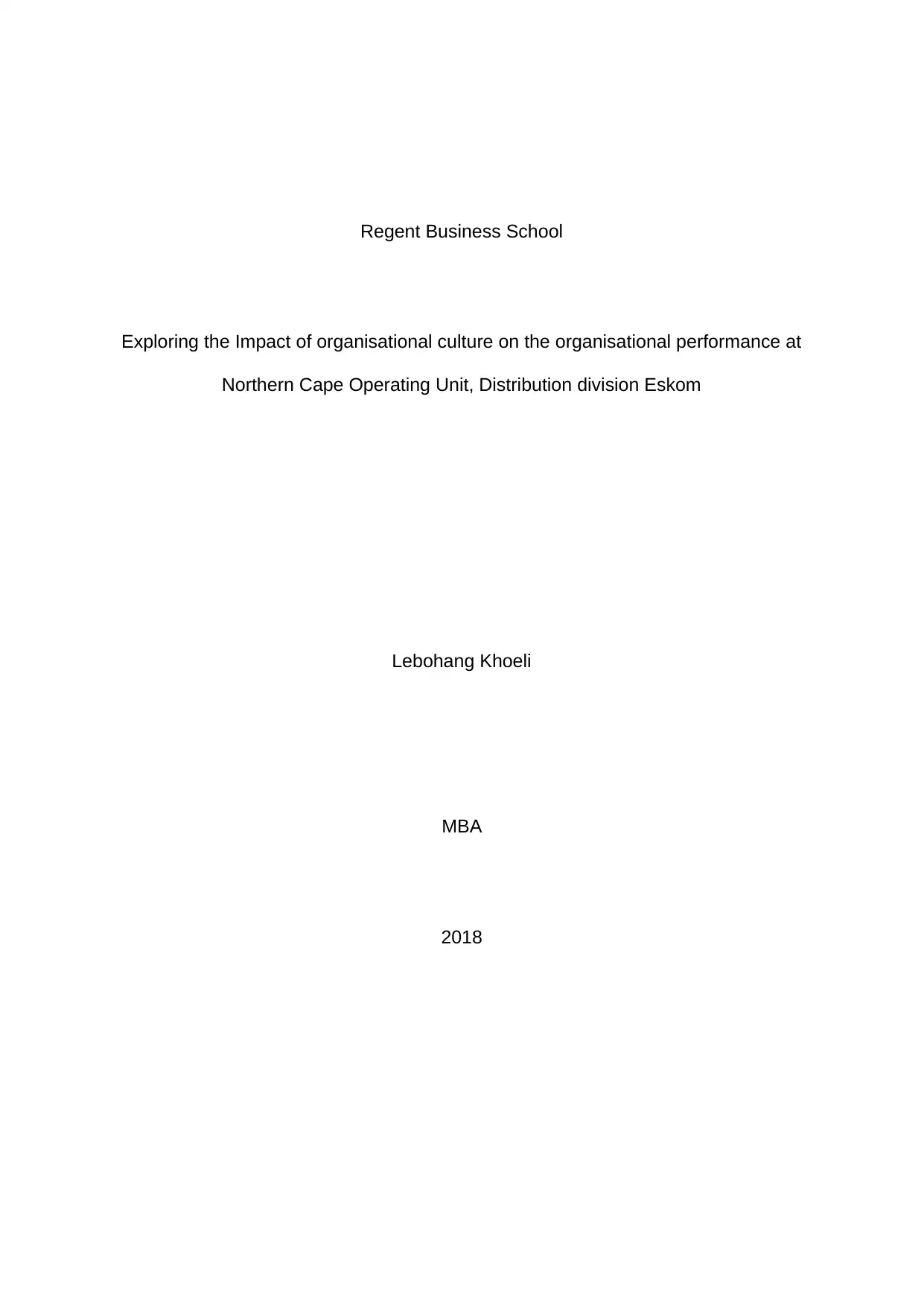
Regent Business School
Exploring the Impact of organisational culture on the organisational performance at
Northern Cape Operating Unit, Distribution division Eskom
Lebohang Khoeli
MBA
2018
Exploring the Impact of organisational culture on the organisational performance at
Northern Cape Operating Unit, Distribution division Eskom
Lebohang Khoeli
MBA
2018
Paraphrase This Document
Need a fresh take? Get an instant paraphrase of this document with our AI Paraphraser
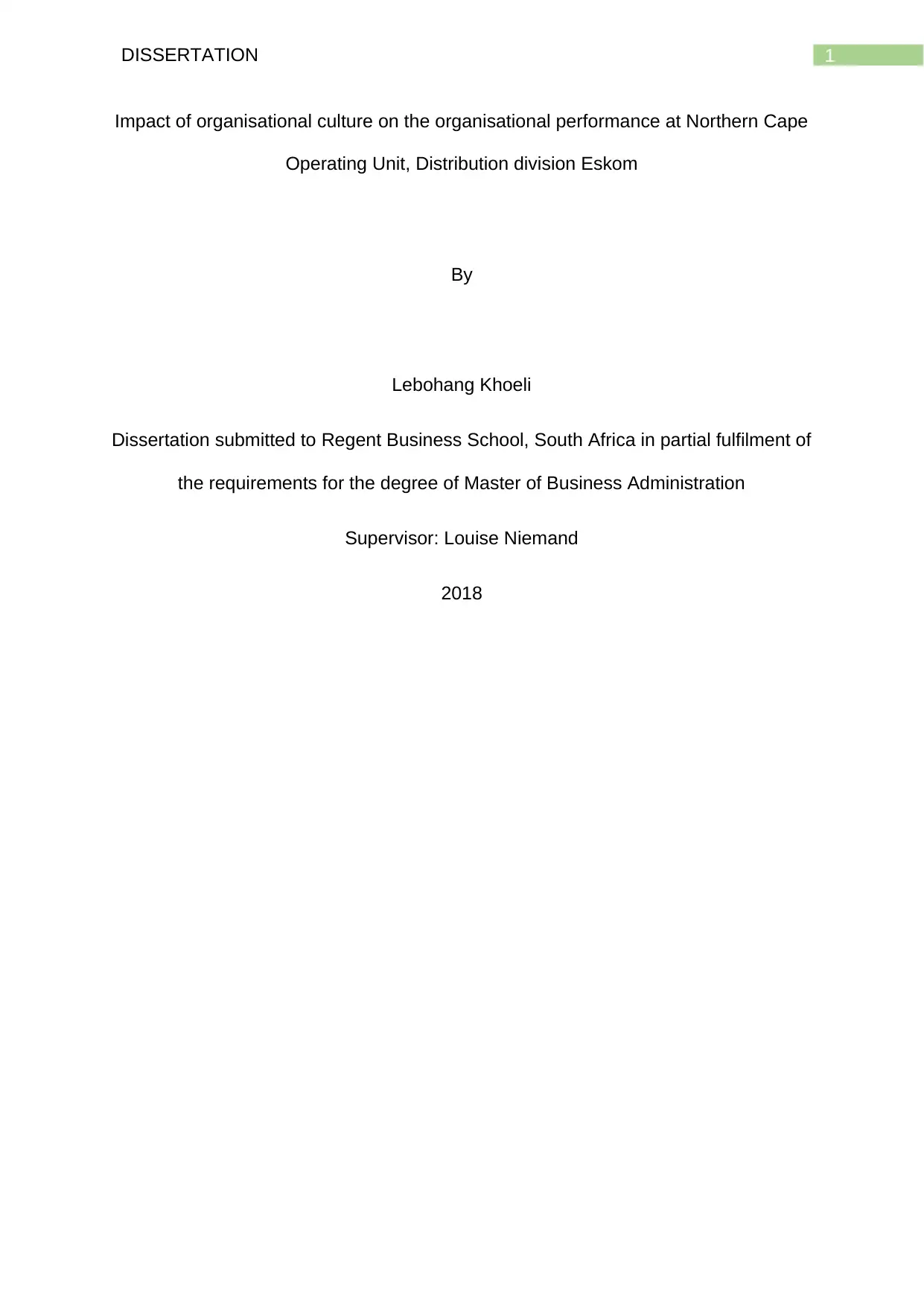
1DISSERTATION
Impact of organisational culture on the organisational performance at Northern Cape
Operating Unit, Distribution division Eskom
By
Lebohang Khoeli
Dissertation submitted to Regent Business School, South Africa in partial fulfilment of
the requirements for the degree of Master of Business Administration
Supervisor: Louise Niemand
2018
Impact of organisational culture on the organisational performance at Northern Cape
Operating Unit, Distribution division Eskom
By
Lebohang Khoeli
Dissertation submitted to Regent Business School, South Africa in partial fulfilment of
the requirements for the degree of Master of Business Administration
Supervisor: Louise Niemand
2018
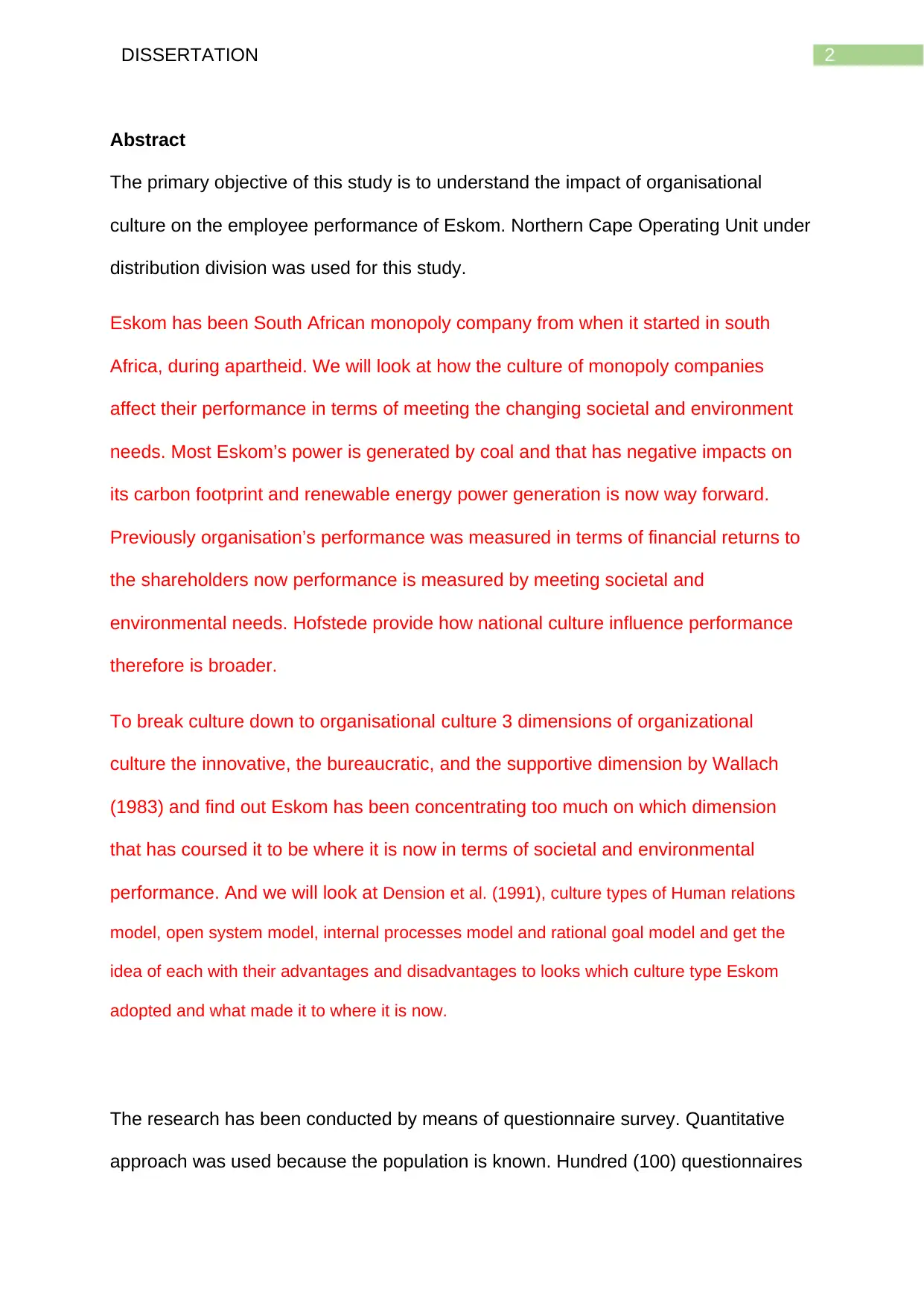
2DISSERTATION
Abstract
The primary objective of this study is to understand the impact of organisational
culture on the employee performance of Eskom. Northern Cape Operating Unit under
distribution division was used for this study.
Eskom has been South African monopoly company from when it started in south
Africa, during apartheid. We will look at how the culture of monopoly companies
affect their performance in terms of meeting the changing societal and environment
needs. Most Eskom’s power is generated by coal and that has negative impacts on
its carbon footprint and renewable energy power generation is now way forward.
Previously organisation’s performance was measured in terms of financial returns to
the shareholders now performance is measured by meeting societal and
environmental needs. Hofstede provide how national culture influence performance
therefore is broader.
To break culture down to organisational culture 3 dimensions of organizational
culture the innovative, the bureaucratic, and the supportive dimension by Wallach
(1983) and find out Eskom has been concentrating too much on which dimension
that has coursed it to be where it is now in terms of societal and environmental
performance. And we will look at Dension et al. (1991), culture types of Human relations
model, open system model, internal processes model and rational goal model and get the
idea of each with their advantages and disadvantages to looks which culture type Eskom
adopted and what made it to where it is now.
The research has been conducted by means of questionnaire survey. Quantitative
approach was used because the population is known. Hundred (100) questionnaires
Abstract
The primary objective of this study is to understand the impact of organisational
culture on the employee performance of Eskom. Northern Cape Operating Unit under
distribution division was used for this study.
Eskom has been South African monopoly company from when it started in south
Africa, during apartheid. We will look at how the culture of monopoly companies
affect their performance in terms of meeting the changing societal and environment
needs. Most Eskom’s power is generated by coal and that has negative impacts on
its carbon footprint and renewable energy power generation is now way forward.
Previously organisation’s performance was measured in terms of financial returns to
the shareholders now performance is measured by meeting societal and
environmental needs. Hofstede provide how national culture influence performance
therefore is broader.
To break culture down to organisational culture 3 dimensions of organizational
culture the innovative, the bureaucratic, and the supportive dimension by Wallach
(1983) and find out Eskom has been concentrating too much on which dimension
that has coursed it to be where it is now in terms of societal and environmental
performance. And we will look at Dension et al. (1991), culture types of Human relations
model, open system model, internal processes model and rational goal model and get the
idea of each with their advantages and disadvantages to looks which culture type Eskom
adopted and what made it to where it is now.
The research has been conducted by means of questionnaire survey. Quantitative
approach was used because the population is known. Hundred (100) questionnaires
⊘ This is a preview!⊘
Do you want full access?
Subscribe today to unlock all pages.

Trusted by 1+ million students worldwide
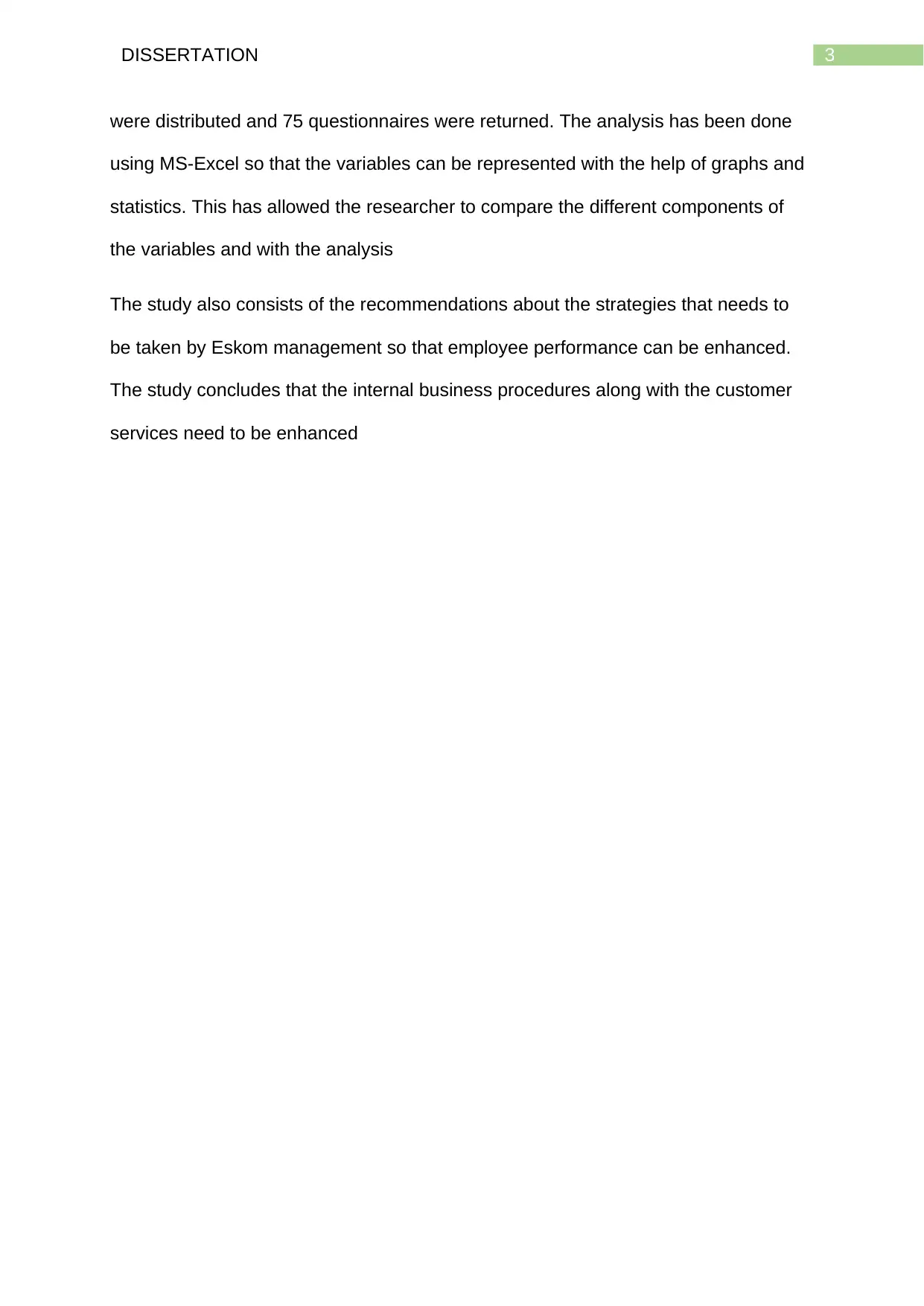
3DISSERTATION
were distributed and 75 questionnaires were returned. The analysis has been done
using MS-Excel so that the variables can be represented with the help of graphs and
statistics. This has allowed the researcher to compare the different components of
the variables and with the analysis
The study also consists of the recommendations about the strategies that needs to
be taken by Eskom management so that employee performance can be enhanced.
The study concludes that the internal business procedures along with the customer
services need to be enhanced
were distributed and 75 questionnaires were returned. The analysis has been done
using MS-Excel so that the variables can be represented with the help of graphs and
statistics. This has allowed the researcher to compare the different components of
the variables and with the analysis
The study also consists of the recommendations about the strategies that needs to
be taken by Eskom management so that employee performance can be enhanced.
The study concludes that the internal business procedures along with the customer
services need to be enhanced
Paraphrase This Document
Need a fresh take? Get an instant paraphrase of this document with our AI Paraphraser
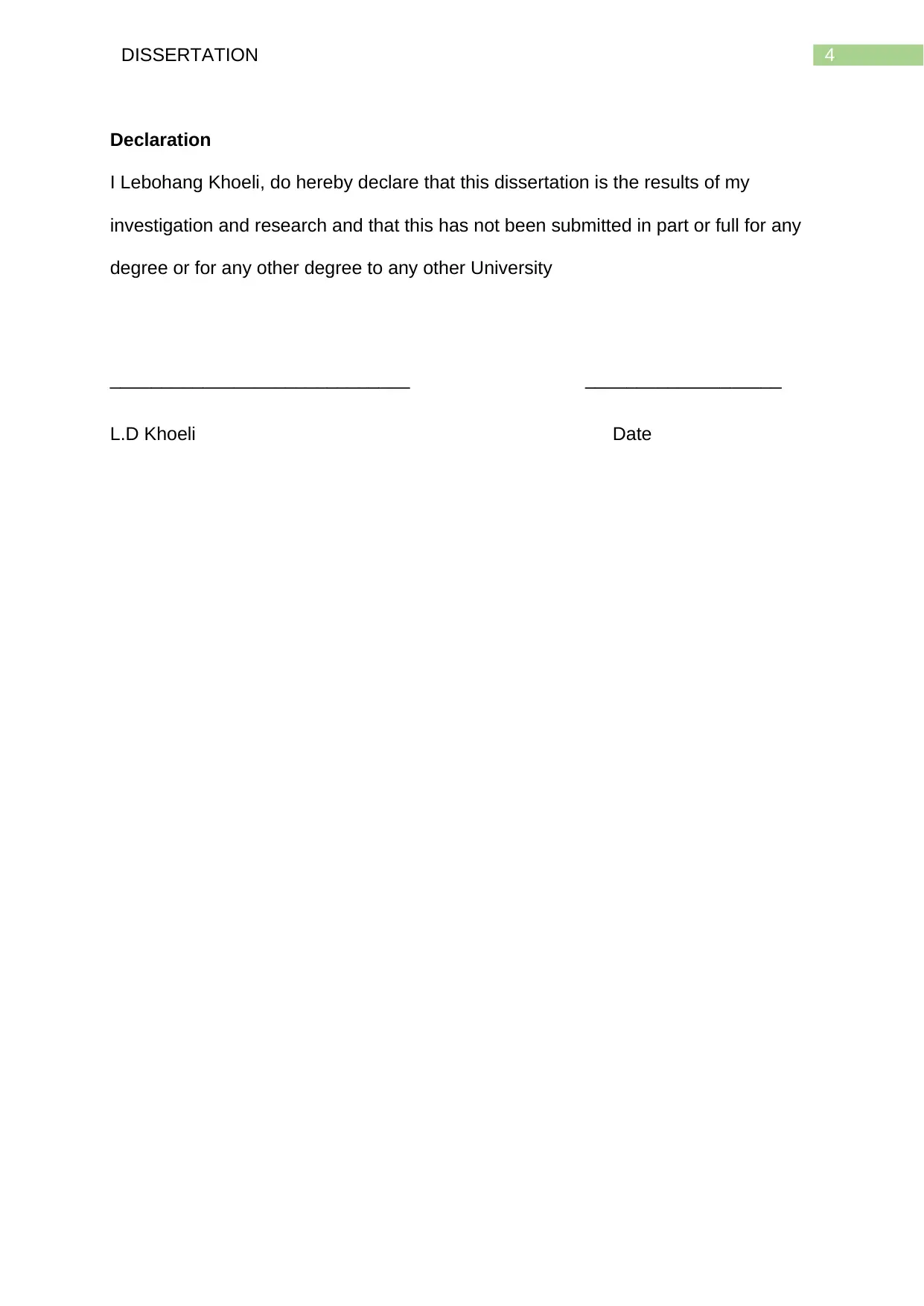
4DISSERTATION
Declaration
I Lebohang Khoeli, do hereby declare that this dissertation is the results of my
investigation and research and that this has not been submitted in part or full for any
degree or for any other degree to any other University
_____________________________ ___________________
L.D Khoeli Date
Declaration
I Lebohang Khoeli, do hereby declare that this dissertation is the results of my
investigation and research and that this has not been submitted in part or full for any
degree or for any other degree to any other University
_____________________________ ___________________
L.D Khoeli Date
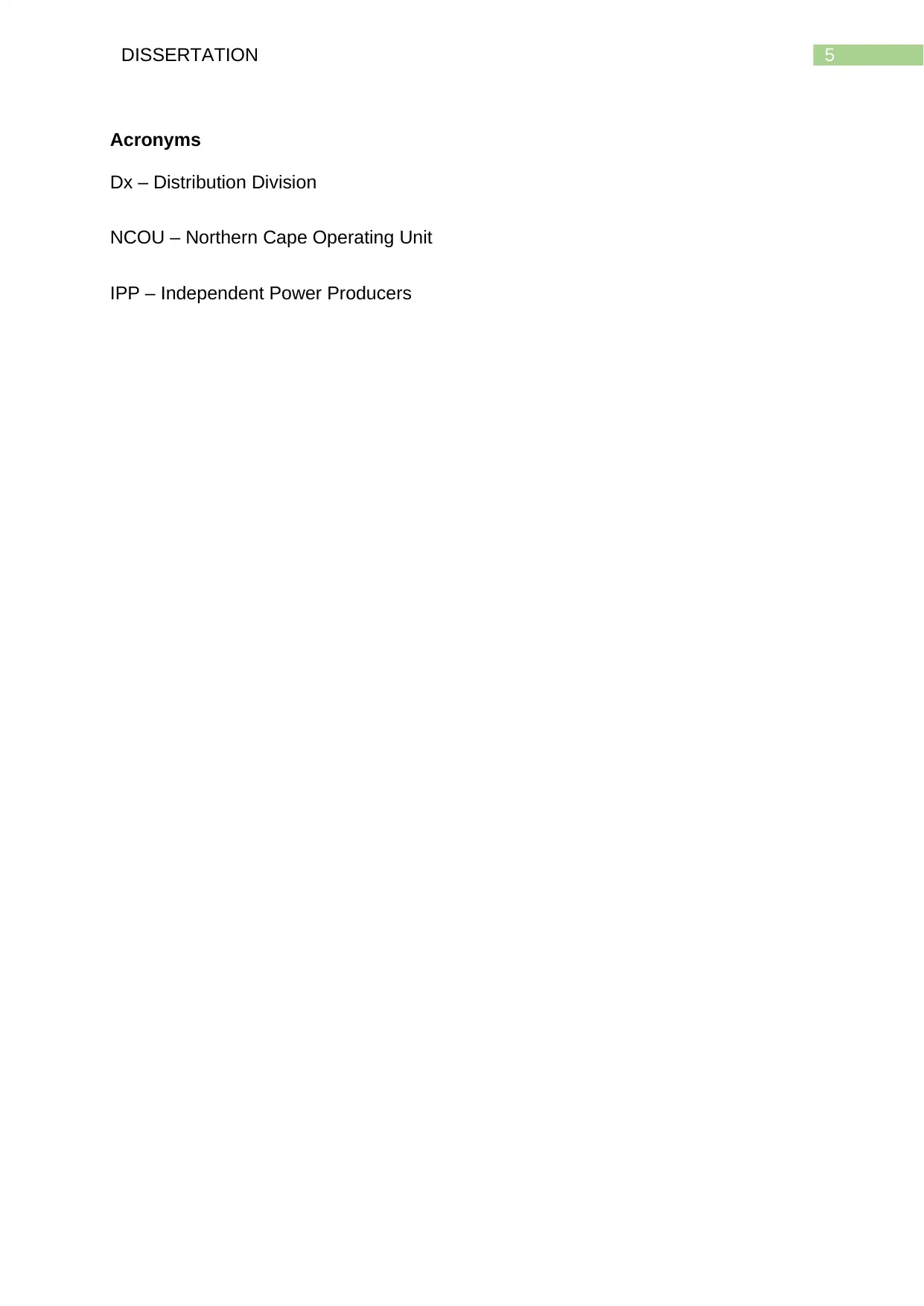
5DISSERTATION
Acronyms
Dx – Distribution Division
NCOU – Northern Cape Operating Unit
IPP – Independent Power Producers
Acronyms
Dx – Distribution Division
NCOU – Northern Cape Operating Unit
IPP – Independent Power Producers
⊘ This is a preview!⊘
Do you want full access?
Subscribe today to unlock all pages.

Trusted by 1+ million students worldwide
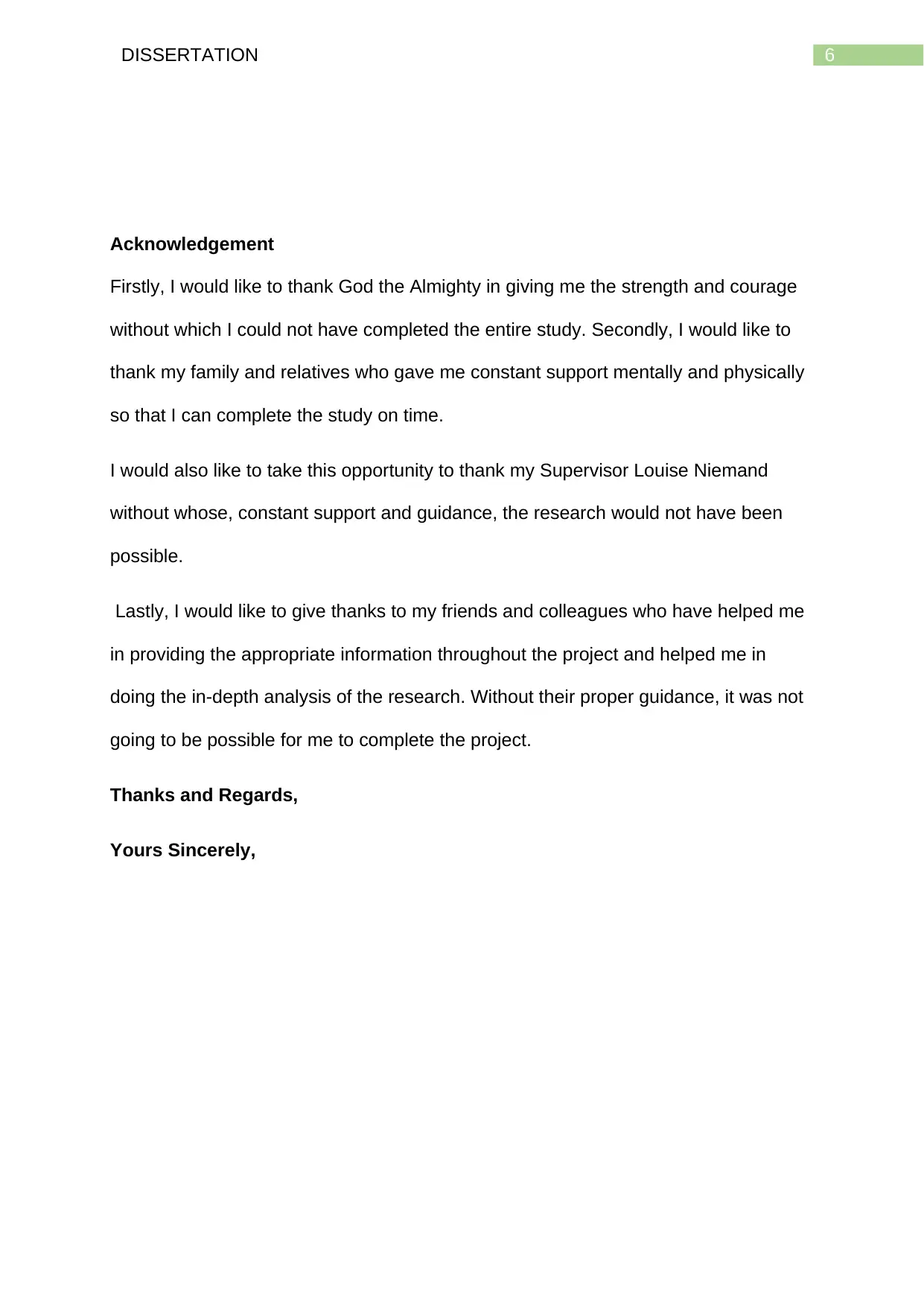
6DISSERTATION
Acknowledgement
Firstly, I would like to thank God the Almighty in giving me the strength and courage
without which I could not have completed the entire study. Secondly, I would like to
thank my family and relatives who gave me constant support mentally and physically
so that I can complete the study on time.
I would also like to take this opportunity to thank my Supervisor Louise Niemand
without whose, constant support and guidance, the research would not have been
possible.
Lastly, I would like to give thanks to my friends and colleagues who have helped me
in providing the appropriate information throughout the project and helped me in
doing the in-depth analysis of the research. Without their proper guidance, it was not
going to be possible for me to complete the project.
Thanks and Regards,
Yours Sincerely,
Acknowledgement
Firstly, I would like to thank God the Almighty in giving me the strength and courage
without which I could not have completed the entire study. Secondly, I would like to
thank my family and relatives who gave me constant support mentally and physically
so that I can complete the study on time.
I would also like to take this opportunity to thank my Supervisor Louise Niemand
without whose, constant support and guidance, the research would not have been
possible.
Lastly, I would like to give thanks to my friends and colleagues who have helped me
in providing the appropriate information throughout the project and helped me in
doing the in-depth analysis of the research. Without their proper guidance, it was not
going to be possible for me to complete the project.
Thanks and Regards,
Yours Sincerely,
Paraphrase This Document
Need a fresh take? Get an instant paraphrase of this document with our AI Paraphraser
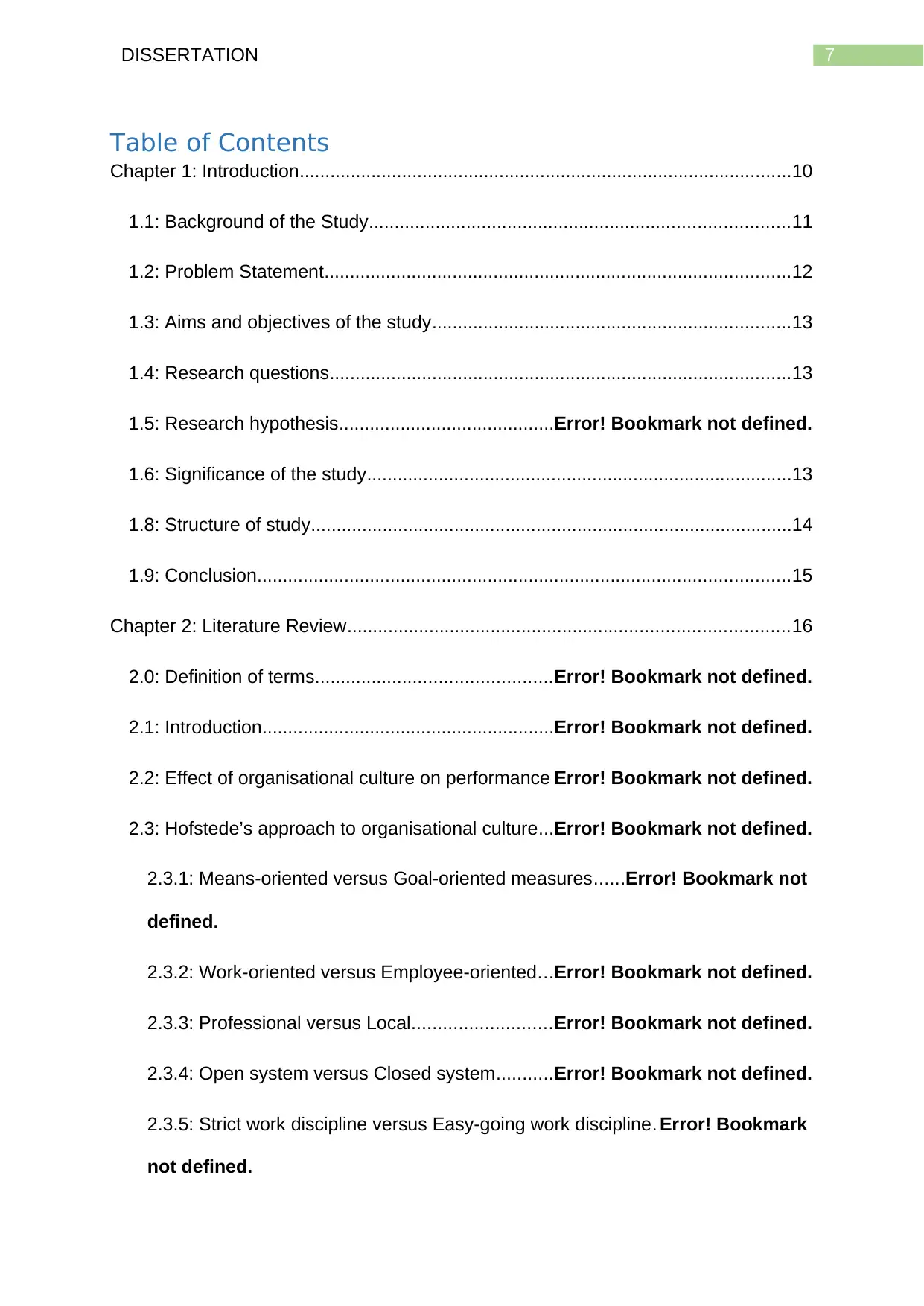
7DISSERTATION
Table of Contents
Chapter 1: Introduction................................................................................................10
1.1: Background of the Study..................................................................................11
1.2: Problem Statement...........................................................................................12
1.3: Aims and objectives of the study......................................................................13
1.4: Research questions..........................................................................................13
1.5: Research hypothesis..........................................Error! Bookmark not defined.
1.6: Significance of the study...................................................................................13
1.8: Structure of study..............................................................................................14
1.9: Conclusion........................................................................................................15
Chapter 2: Literature Review......................................................................................16
2.0: Definition of terms..............................................Error! Bookmark not defined.
2.1: Introduction.........................................................Error! Bookmark not defined.
2.2: Effect of organisational culture on performance Error! Bookmark not defined.
2.3: Hofstede’s approach to organisational culture...Error! Bookmark not defined.
2.3.1: Means-oriented versus Goal-oriented measures......Error! Bookmark not
defined.
2.3.2: Work-oriented versus Employee-oriented...Error! Bookmark not defined.
2.3.3: Professional versus Local...........................Error! Bookmark not defined.
2.3.4: Open system versus Closed system...........Error! Bookmark not defined.
2.3.5: Strict work discipline versus Easy-going work discipline. Error! Bookmark
not defined.
Table of Contents
Chapter 1: Introduction................................................................................................10
1.1: Background of the Study..................................................................................11
1.2: Problem Statement...........................................................................................12
1.3: Aims and objectives of the study......................................................................13
1.4: Research questions..........................................................................................13
1.5: Research hypothesis..........................................Error! Bookmark not defined.
1.6: Significance of the study...................................................................................13
1.8: Structure of study..............................................................................................14
1.9: Conclusion........................................................................................................15
Chapter 2: Literature Review......................................................................................16
2.0: Definition of terms..............................................Error! Bookmark not defined.
2.1: Introduction.........................................................Error! Bookmark not defined.
2.2: Effect of organisational culture on performance Error! Bookmark not defined.
2.3: Hofstede’s approach to organisational culture...Error! Bookmark not defined.
2.3.1: Means-oriented versus Goal-oriented measures......Error! Bookmark not
defined.
2.3.2: Work-oriented versus Employee-oriented...Error! Bookmark not defined.
2.3.3: Professional versus Local...........................Error! Bookmark not defined.
2.3.4: Open system versus Closed system...........Error! Bookmark not defined.
2.3.5: Strict work discipline versus Easy-going work discipline. Error! Bookmark
not defined.
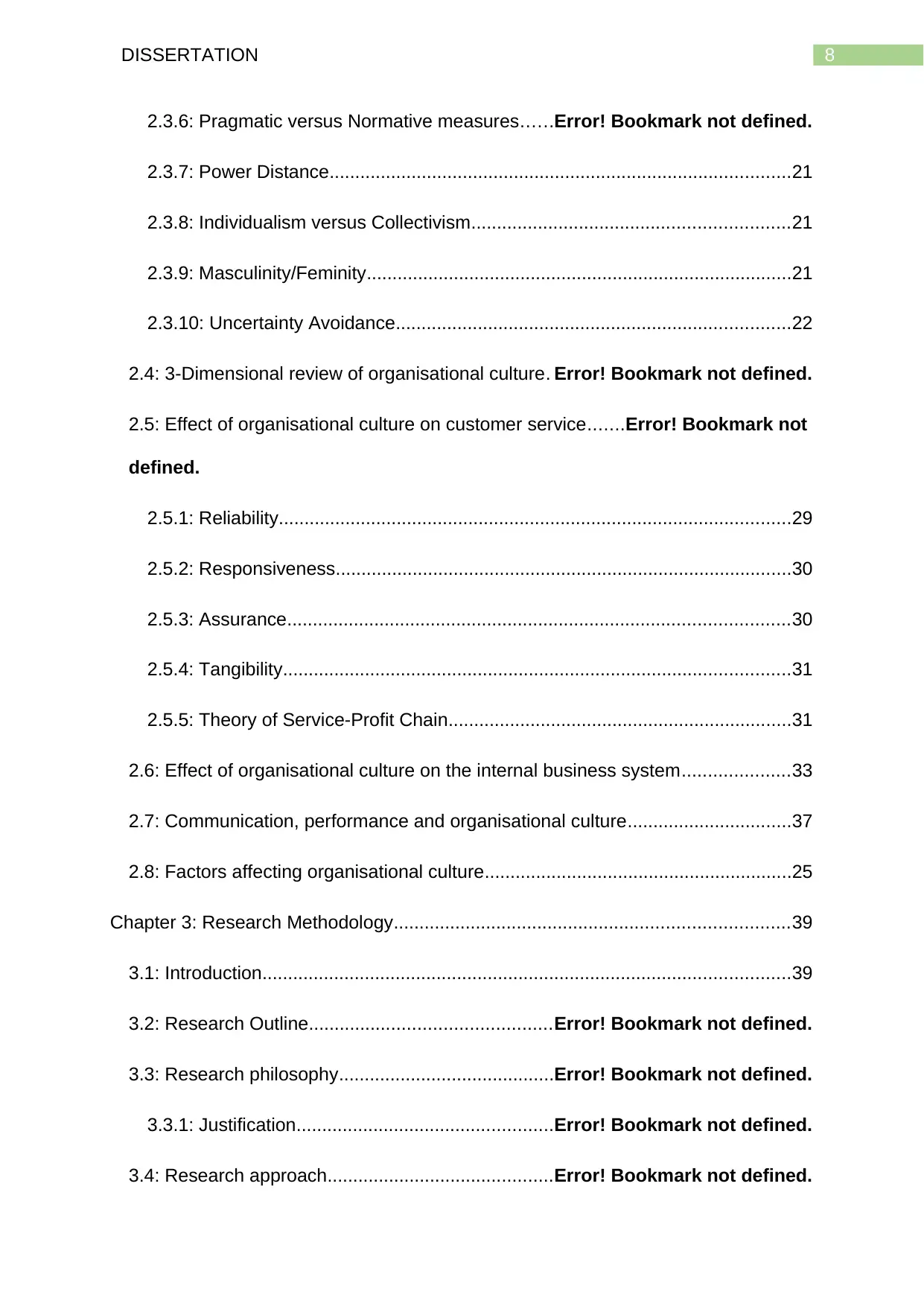
8DISSERTATION
2.3.6: Pragmatic versus Normative measures......Error! Bookmark not defined.
2.3.7: Power Distance..........................................................................................21
2.3.8: Individualism versus Collectivism..............................................................21
2.3.9: Masculinity/Feminity...................................................................................21
2.3.10: Uncertainty Avoidance.............................................................................22
2.4: 3-Dimensional review of organisational culture. Error! Bookmark not defined.
2.5: Effect of organisational culture on customer service.......Error! Bookmark not
defined.
2.5.1: Reliability....................................................................................................29
2.5.2: Responsiveness.........................................................................................30
2.5.3: Assurance..................................................................................................30
2.5.4: Tangibility...................................................................................................31
2.5.5: Theory of Service-Profit Chain...................................................................31
2.6: Effect of organisational culture on the internal business system.....................33
2.7: Communication, performance and organisational culture................................37
2.8: Factors affecting organisational culture............................................................25
Chapter 3: Research Methodology.............................................................................39
3.1: Introduction.......................................................................................................39
3.2: Research Outline...............................................Error! Bookmark not defined.
3.3: Research philosophy..........................................Error! Bookmark not defined.
3.3.1: Justification..................................................Error! Bookmark not defined.
3.4: Research approach............................................Error! Bookmark not defined.
2.3.6: Pragmatic versus Normative measures......Error! Bookmark not defined.
2.3.7: Power Distance..........................................................................................21
2.3.8: Individualism versus Collectivism..............................................................21
2.3.9: Masculinity/Feminity...................................................................................21
2.3.10: Uncertainty Avoidance.............................................................................22
2.4: 3-Dimensional review of organisational culture. Error! Bookmark not defined.
2.5: Effect of organisational culture on customer service.......Error! Bookmark not
defined.
2.5.1: Reliability....................................................................................................29
2.5.2: Responsiveness.........................................................................................30
2.5.3: Assurance..................................................................................................30
2.5.4: Tangibility...................................................................................................31
2.5.5: Theory of Service-Profit Chain...................................................................31
2.6: Effect of organisational culture on the internal business system.....................33
2.7: Communication, performance and organisational culture................................37
2.8: Factors affecting organisational culture............................................................25
Chapter 3: Research Methodology.............................................................................39
3.1: Introduction.......................................................................................................39
3.2: Research Outline...............................................Error! Bookmark not defined.
3.3: Research philosophy..........................................Error! Bookmark not defined.
3.3.1: Justification..................................................Error! Bookmark not defined.
3.4: Research approach............................................Error! Bookmark not defined.
⊘ This is a preview!⊘
Do you want full access?
Subscribe today to unlock all pages.

Trusted by 1+ million students worldwide
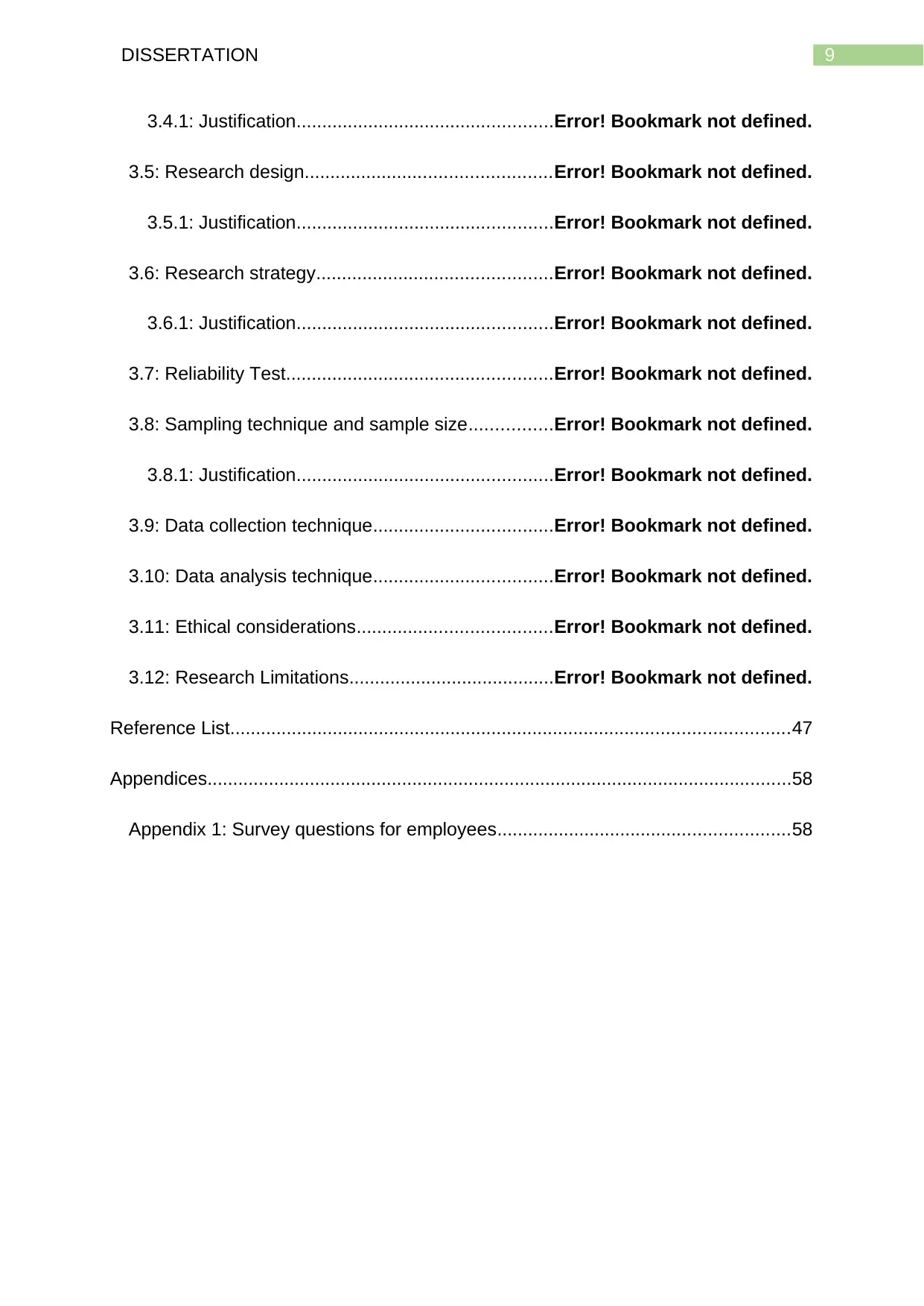
9DISSERTATION
3.4.1: Justification..................................................Error! Bookmark not defined.
3.5: Research design................................................Error! Bookmark not defined.
3.5.1: Justification..................................................Error! Bookmark not defined.
3.6: Research strategy..............................................Error! Bookmark not defined.
3.6.1: Justification..................................................Error! Bookmark not defined.
3.7: Reliability Test....................................................Error! Bookmark not defined.
3.8: Sampling technique and sample size................Error! Bookmark not defined.
3.8.1: Justification..................................................Error! Bookmark not defined.
3.9: Data collection technique...................................Error! Bookmark not defined.
3.10: Data analysis technique...................................Error! Bookmark not defined.
3.11: Ethical considerations......................................Error! Bookmark not defined.
3.12: Research Limitations........................................Error! Bookmark not defined.
Reference List.............................................................................................................47
Appendices..................................................................................................................58
Appendix 1: Survey questions for employees.........................................................58
3.4.1: Justification..................................................Error! Bookmark not defined.
3.5: Research design................................................Error! Bookmark not defined.
3.5.1: Justification..................................................Error! Bookmark not defined.
3.6: Research strategy..............................................Error! Bookmark not defined.
3.6.1: Justification..................................................Error! Bookmark not defined.
3.7: Reliability Test....................................................Error! Bookmark not defined.
3.8: Sampling technique and sample size................Error! Bookmark not defined.
3.8.1: Justification..................................................Error! Bookmark not defined.
3.9: Data collection technique...................................Error! Bookmark not defined.
3.10: Data analysis technique...................................Error! Bookmark not defined.
3.11: Ethical considerations......................................Error! Bookmark not defined.
3.12: Research Limitations........................................Error! Bookmark not defined.
Reference List.............................................................................................................47
Appendices..................................................................................................................58
Appendix 1: Survey questions for employees.........................................................58
Paraphrase This Document
Need a fresh take? Get an instant paraphrase of this document with our AI Paraphraser
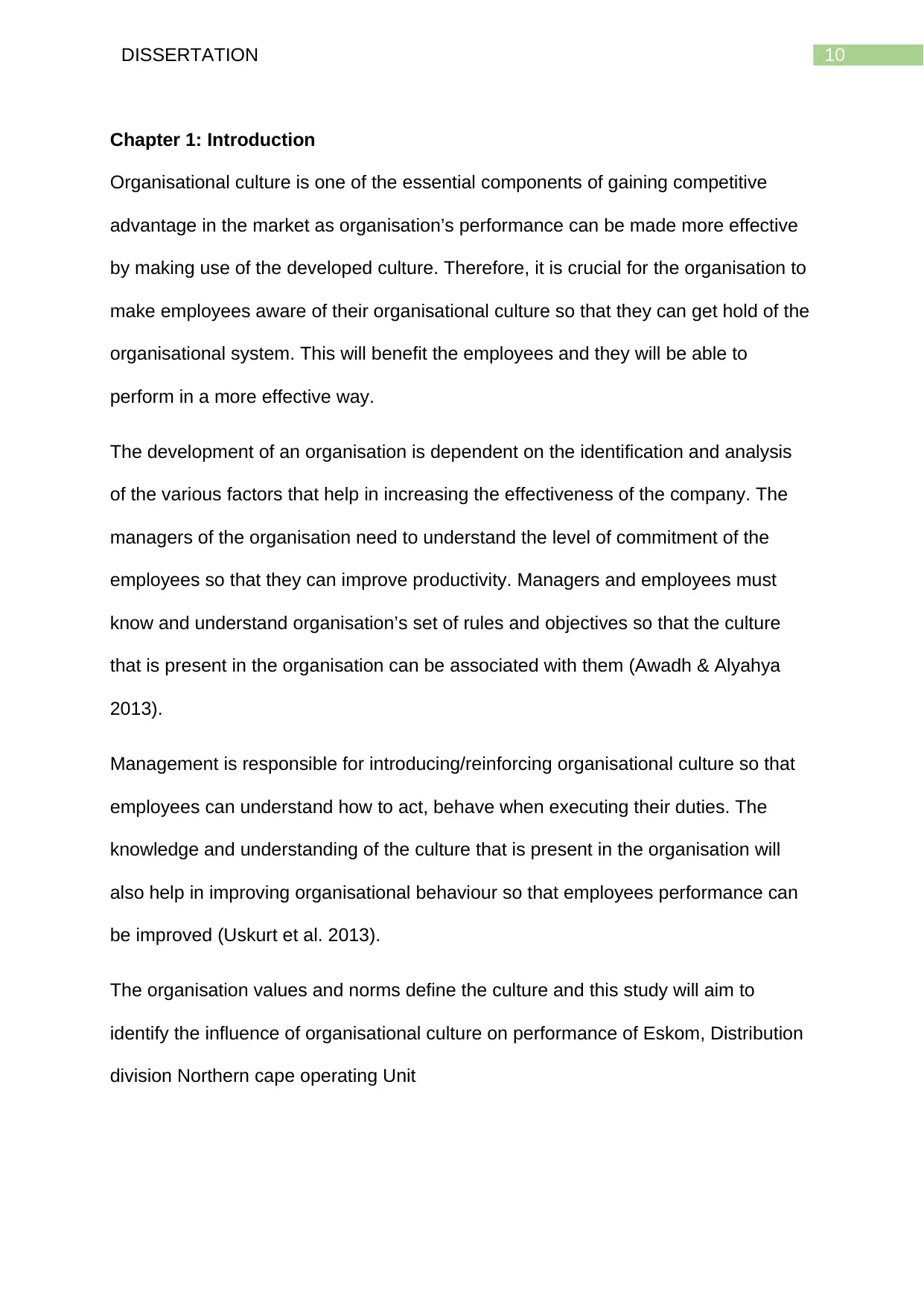
10DISSERTATION
Chapter 1: Introduction
Organisational culture is one of the essential components of gaining competitive
advantage in the market as organisation’s performance can be made more effective
by making use of the developed culture. Therefore, it is crucial for the organisation to
make employees aware of their organisational culture so that they can get hold of the
organisational system. This will benefit the employees and they will be able to
perform in a more effective way.
The development of an organisation is dependent on the identification and analysis
of the various factors that help in increasing the effectiveness of the company. The
managers of the organisation need to understand the level of commitment of the
employees so that they can improve productivity. Managers and employees must
know and understand organisation’s set of rules and objectives so that the culture
that is present in the organisation can be associated with them (Awadh & Alyahya
2013).
Management is responsible for introducing/reinforcing organisational culture so that
employees can understand how to act, behave when executing their duties. The
knowledge and understanding of the culture that is present in the organisation will
also help in improving organisational behaviour so that employees performance can
be improved (Uskurt et al. 2013).
The organisation values and norms define the culture and this study will aim to
identify the influence of organisational culture on performance of Eskom, Distribution
division Northern cape operating Unit
Chapter 1: Introduction
Organisational culture is one of the essential components of gaining competitive
advantage in the market as organisation’s performance can be made more effective
by making use of the developed culture. Therefore, it is crucial for the organisation to
make employees aware of their organisational culture so that they can get hold of the
organisational system. This will benefit the employees and they will be able to
perform in a more effective way.
The development of an organisation is dependent on the identification and analysis
of the various factors that help in increasing the effectiveness of the company. The
managers of the organisation need to understand the level of commitment of the
employees so that they can improve productivity. Managers and employees must
know and understand organisation’s set of rules and objectives so that the culture
that is present in the organisation can be associated with them (Awadh & Alyahya
2013).
Management is responsible for introducing/reinforcing organisational culture so that
employees can understand how to act, behave when executing their duties. The
knowledge and understanding of the culture that is present in the organisation will
also help in improving organisational behaviour so that employees performance can
be improved (Uskurt et al. 2013).
The organisation values and norms define the culture and this study will aim to
identify the influence of organisational culture on performance of Eskom, Distribution
division Northern cape operating Unit
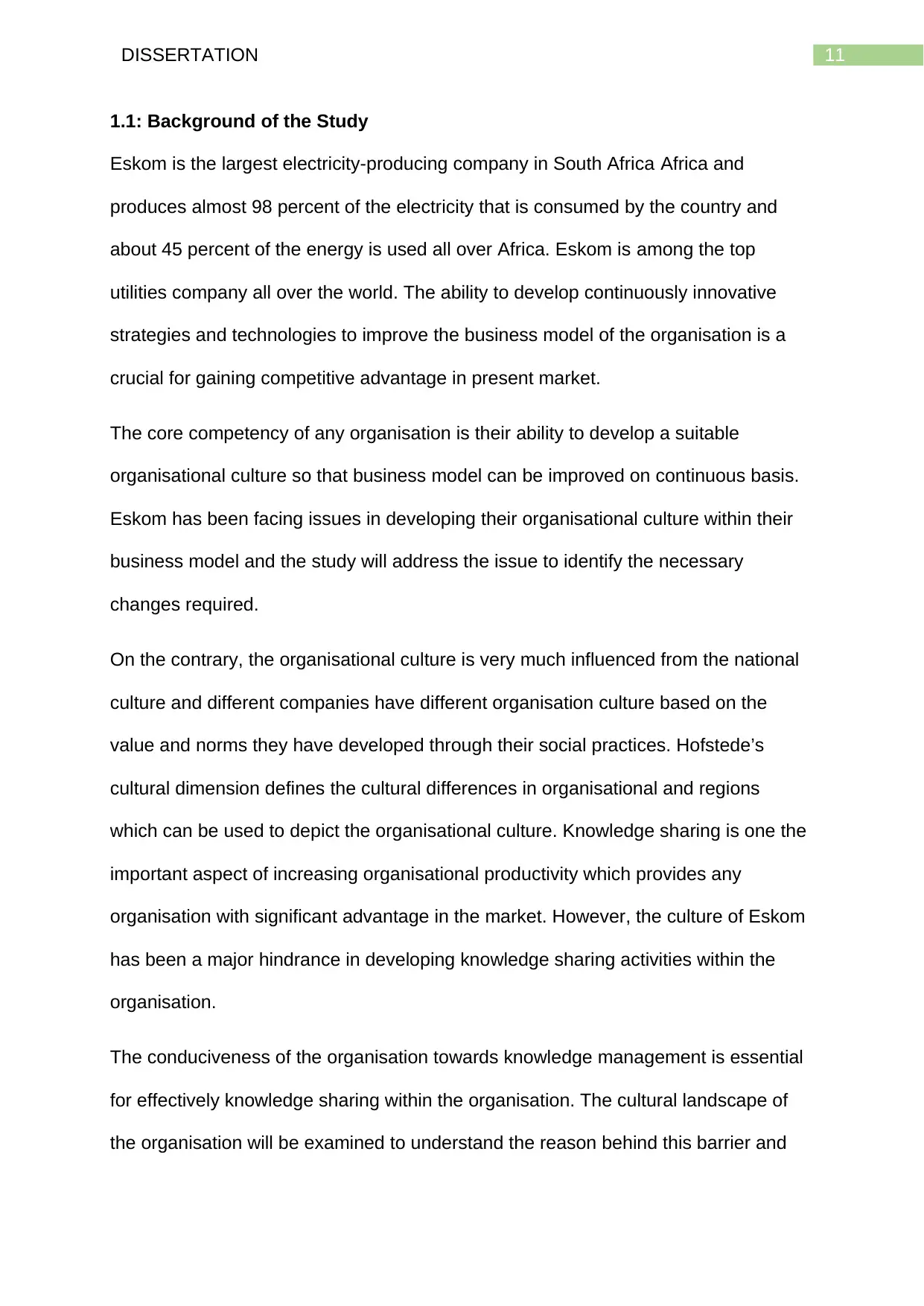
11DISSERTATION
1.1: Background of the Study
Eskom is the largest electricity-producing company in South Africa Africa and
produces almost 98 percent of the electricity that is consumed by the country and
about 45 percent of the energy is used all over Africa. Eskom is among the top
utilities company all over the world. The ability to develop continuously innovative
strategies and technologies to improve the business model of the organisation is a
crucial for gaining competitive advantage in present market.
The core competency of any organisation is their ability to develop a suitable
organisational culture so that business model can be improved on continuous basis.
Eskom has been facing issues in developing their organisational culture within their
business model and the study will address the issue to identify the necessary
changes required.
On the contrary, the organisational culture is very much influenced from the national
culture and different companies have different organisation culture based on the
value and norms they have developed through their social practices. Hofstede’s
cultural dimension defines the cultural differences in organisational and regions
which can be used to depict the organisational culture. Knowledge sharing is one the
important aspect of increasing organisational productivity which provides any
organisation with significant advantage in the market. However, the culture of Eskom
has been a major hindrance in developing knowledge sharing activities within the
organisation.
The conduciveness of the organisation towards knowledge management is essential
for effectively knowledge sharing within the organisation. The cultural landscape of
the organisation will be examined to understand the reason behind this barrier and
1.1: Background of the Study
Eskom is the largest electricity-producing company in South Africa Africa and
produces almost 98 percent of the electricity that is consumed by the country and
about 45 percent of the energy is used all over Africa. Eskom is among the top
utilities company all over the world. The ability to develop continuously innovative
strategies and technologies to improve the business model of the organisation is a
crucial for gaining competitive advantage in present market.
The core competency of any organisation is their ability to develop a suitable
organisational culture so that business model can be improved on continuous basis.
Eskom has been facing issues in developing their organisational culture within their
business model and the study will address the issue to identify the necessary
changes required.
On the contrary, the organisational culture is very much influenced from the national
culture and different companies have different organisation culture based on the
value and norms they have developed through their social practices. Hofstede’s
cultural dimension defines the cultural differences in organisational and regions
which can be used to depict the organisational culture. Knowledge sharing is one the
important aspect of increasing organisational productivity which provides any
organisation with significant advantage in the market. However, the culture of Eskom
has been a major hindrance in developing knowledge sharing activities within the
organisation.
The conduciveness of the organisation towards knowledge management is essential
for effectively knowledge sharing within the organisation. The cultural landscape of
the organisation will be examined to understand the reason behind this barrier and
⊘ This is a preview!⊘
Do you want full access?
Subscribe today to unlock all pages.

Trusted by 1+ million students worldwide
1 out of 70
Your All-in-One AI-Powered Toolkit for Academic Success.
+13062052269
info@desklib.com
Available 24*7 on WhatsApp / Email
![[object Object]](/_next/static/media/star-bottom.7253800d.svg)
Unlock your academic potential
Copyright © 2020–2026 A2Z Services. All Rights Reserved. Developed and managed by ZUCOL.


